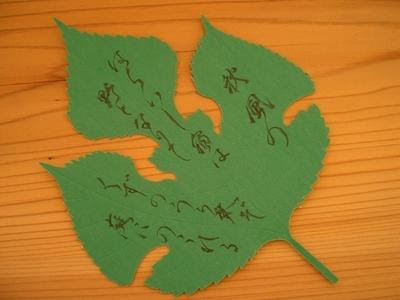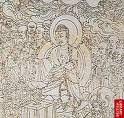old legends
coming back to life ...
summer chill

woodblock by Kuniyoshi 国芳
|
NUE, nue 鵺, 鵼, 恠鳥, or 奴延鳥 the Nue monster
- 園韓神 Sonorakarami
The two shrines for SONO and KAMI 園韓二社.
Nue is a monster beast with the head of a monkey, breast of a Tanuki badger, scales like a dragon, a tail of a serpent and hands and feet like a tiger. His voice was that of a Nue.
:::::::::::::::::::::::::::::::::::::::::::::::::::::::::::::::::::::::::::::::::::::::::::::::::::::
- quote -
Today we’ll look at a strange chimerical monster called the Nue!

The nue is one of the oldest yokai to be written down, having its first appearance in the Kojiki (712 CE), an account of the early histories of Japan. It also appears in the
Heian-period encyclopedia Wamyo Ruijusho (938 CE), and again in the Heike Monogatari (1371 CE), a record of one of Japan’s bloodiest civil wars and most tragic family clans. It is recorded as having the head of a monkey, the body of a tanuki, the tail of a snake, and the limbs of a tiger. In ancient times it was thought to be a kind of nocturnal bird — it’s call is supposed to sound like that of a White’s thrush — and thus its name is written with a kanji that contains the meanings “night” and “bird.”
Unlike some of the Japanese chimeras we’ve seen (kirin, baku, houou), the nue is not a holy animal, and is not good at all. In fact, they are considered to be pretty evil monsters. One very famous account of a nue attack occurs in the summer of 1153 in Kyoto. Emperor Konoe began to have nightmares every night, and grew very ill. Neither medicine nor prayers had any effect on his illness, and the source was attributed to some kind of evil spirit which was visiting the palace every night, early in the morning. These events climaxed some days later in a storm which appeared over the imperial palace around 2 AM. Lightning struck the roof, setting it on fire. The emperor summoned the legendary samurai Minamoto no Yorimasa, to deal with the evil spirit. Yorimasa brought his trusted companion I no Hayata, and his legendary bow which he received from Minamoto no Yorimitsu, to hunt the best. During the night, a strange wind came over them, followed by a black cloud. Yorimasa fired his
arrow into the clouds above the palace, and out from the sky came a horrible scream as a nue dropped to the earth. I no Hayata immediately leaped upon the body, dealing it a finishing blow. The emperor immediately recovered from his illness, and rewarded the heroes with the legendary katana Shishiou for their service. This event has been immortalized in numerous paintings and ukiyoe prints.
After the nue was slain, the inhabitants of Kyoto were so afraid of a curse for killing the best, that they loaded its body in a ship and sent it down the Kamo river. The boat with the nue’s body eventually washed up on the shore near the village of Ashiya in Hyogo prefecture, and the good citizens of Ashiya removed the body and built it a burial mound and gave it a proper funeral. Apparently, you can still visit the mound, “Nuezuka,” today, though I’ve never been there . . .
- source : matthewmeyer.net -

Shinmei Jinja shrine, right off of Karasuma-Shijo intersection, that venerates the arrowheads used to fell the dreaded Nue! These are supposedly the very ones from the famous tale.
- source : Matt Alt, facebook -
:::::::::::::::::::::::::::::::::::::::::::::::::::::::::::::::::::::::::::::::::::::::::::::::::::::
quote
Yorimasa Minamoto 源頼政
killed a monster Nue
source : daishogun-shrine-kyoto
at Daishogun Jinja is the spirit of Kaneie Fujiwara, a Heian Period courtier. The little sign at the entrance also says, and I quote verbatim: “The scene of the legend that tells Yorimasa Minamoto killed a monster Nue.”
Yorimasa Minamoto was a late-Heian Period poet, courtier and warrior. He was a historical figure, but his exploits became the stuff of legend, including his killing a Nue, a mythical beast, nasty monster comprised of bits of several animals.
 Yorimasa Minamoto (R) & Ino Hayata Tadazumi killing a Nue.
. Daishogun Jinja 大将軍神社 .
Yorimasa Minamoto (R) & Ino Hayata Tadazumi killing a Nue.
. Daishogun Jinja 大将軍神社 .
:::::::::::::::::::::::::::::::::::::::::::::::::::::::::::::::::::::::::::::::::::::::::::::::::::::
A nue (鵺) is a legendary creature
found in Japanese folklore. It is described as having the head of a monkey, the body of a raccoon dog, the legs of a tiger, and a snake as a tail. According to the legend, a nue can metamorphose into a black cloud and fly. Due to its appearance, it is sometimes referred to as a Japanese chimera.
Nue are supposed to be bringers of misfortune and illness.
According to The Tale of the Heike, Emperor Konoe, the Emperor of Japan, became ill after having terrible nightmares every night, and a dark cloud appeared at two o'clock in the morning on the roof of the palace in Kyoto during the summer of 1153. The story says that the samurai
Minamoto no Yorimasa staked-out the roof one night and fired an arrow into the cloud, out of which fell a dead nue. Yorimasa had gotten the arrow from his mother. it was a special arrow with a tip that makes a sound (hikime 蟇目). His mother died the next day, but the Nue did no more harm.
Yorimasu then supposedly sank the body in the Sea of Japan.
In a local expansion of the story, the nue's corpse floated into a certain bay, and the locals, fearing a curse, buried it. A mound near the bay which exists today is supposed to be the grave created for this nue.
Etymology
The word, Nue, appears in the oldest of Japanese literature. Early quotes include Kojiki (712) and Wamyō Ruijushō (c. 934). Due to the use of Man'yōgana, the historical spelling is known to have been nuye. At this early time, although, it had a different semantic meaning. It referred to a bird known as White's Thrush.
In the thirteenth century, Heike Monogatari makes reference to a creature called a nue. In addition to having the head of a monkey, the body of a tanuki, the paws of a tiger, and a snake as a tail, it has the voice of a White's Thrush.
Around 1435, Zeami Motokiyo wrote a Noh song titled Nue dealing with the events described in Heike.
© More in the WIKIPEDIA !
 Yorimasa and the Nue
Yorimasa and the Nue
A famous
nue from
. Shishinden 紫宸殿 Hall for State Ceremonies .
:::::::::::::::::::::::::::::::::::::::::::::::::::::::::::::::::::::::::::::::::::::::::::::::::::::::::::::::::::::::::::
- - - - - Legends about the Nue 鵺 - - - - -
.......................... Ehime 愛媛県
The cursed Nue came floating in the sea to Shikoku.
Its head landed in Sanuki and became a monkey deity.
Its tail landed in Iyo and became a serpent deity.
Its hands and feet landed in Tosa and became a
dog deity.
頭は讃岐に着き猿神に、尾は伊予で蛇神に、手足は土佐、阿波に着いて犬神になった
When the beast flew over the village 父二峰村 Fujimine near 久万高原町 Kuma Kogen it blew out its venomous breath. This is why to our day there are many days with thick fog in the area.
上浮穴郡
Kamiukena district
A legend from Kamiukena tells about the mother of Yorimasa, who was a large serpent. She wanted to give her son a chance to become famous and shifted her shape into a Nue. This was the one he killed with his arrow. She had given him special arrows made from the local bamboo.
There are various legends in Tosa about the
. Inugami 犬神 "Dog Deity" monster .
.......................... Kyoto 京都府
The place where the monster killed by Yorimasa fell down was called the
nue ike 鵺池 Nue pond. The boulders aroung this pond are called
nueishi 鵺石 in a forest called
nue no mori 鵺の森.
The stones were used to build a wall around the pond.

If someone touches these stones, he will be cursed. Even the powerful regent Toyotomi Hideyoshi did not dare to give that area as fief to anyone.
The beast had become a dreaded deity
Nue Daimyoojin 鵺大明神 Nue Daimyojin.
The voice when the Nue was killed could be heard as far as temple 三井寺 Miidera.
.......................................................................
- source : nichibun yokai database -
. - yookai, yōkai 妖怪 Yokai monsters - .
- Introduction -
:::::::::::::::::::::::::::::::::::::::::::::::::::::::::::::::::::::::::::::::::::::::::::::::::::::::::::::::::::::::::::
. hariko 張子 papermachee dolls .

:::::::::::::::::::::::::::::::::::::::::::::::::::::::::::::::::::::::::::::::::::::::::::::::::::::::::::::::::::::::::::
. Ghost stories told in Summer .
[ . BACK to WORLDKIGO . TOP . ]
[ . BACK to DARUMA MUSEUM TOP . ]
- #nue #nuemonster -
:::::::::::::::::::::::::::::::::::::::::::::::::::::::::::::::::::::::::::::::::::::::::::::::::::::




























